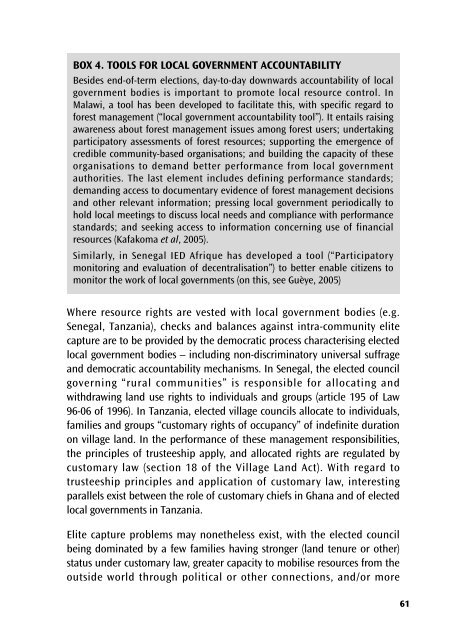Legal empowerment for local resource control
Legal empowerment for local resource control
Legal empowerment for local resource control
You also want an ePaper? Increase the reach of your titles
YUMPU automatically turns print PDFs into web optimized ePapers that Google loves.
BOX 4. TOOLS FOR LOCAL GOVERNMENT ACCOUNTABILITY<br />
Besides end-of-term elections, day-to-day downwards accountability of <strong>local</strong><br />
government bodies is important to promote <strong>local</strong> <strong>resource</strong> <strong>control</strong>. In<br />
Malawi, a tool has been developed to facilitate this, with specific regard to<br />
<strong>for</strong>est management (“<strong>local</strong> government accountability tool”). It entails raising<br />
awareness about <strong>for</strong>est management issues among <strong>for</strong>est users; undertaking<br />
participatory assessments of <strong>for</strong>est <strong>resource</strong>s; supporting the emergence of<br />
credible community-based organisations; and building the capacity of these<br />
organisations to demand better per<strong>for</strong>mance from <strong>local</strong> government<br />
authorities. The last element includes defining per<strong>for</strong>mance standards;<br />
demanding access to documentary evidence of <strong>for</strong>est management decisions<br />
and other relevant in<strong>for</strong>mation; pressing <strong>local</strong> government periodically to<br />
hold <strong>local</strong> meetings to discuss <strong>local</strong> needs and compliance with per<strong>for</strong>mance<br />
standards; and seeking access to in<strong>for</strong>mation concerning use of financial<br />
<strong>resource</strong>s (Kafakoma et al, 2005).<br />
Similarly, in Senegal IED Afrique has developed a tool (“Participatory<br />
monitoring and evaluation of decentralisation”) to better enable citizens to<br />
monitor the work of <strong>local</strong> governments (on this, see Guèye, 2005)<br />
Where <strong>resource</strong> rights are vested with <strong>local</strong> government bodies (e.g.<br />
Senegal, Tanzania), checks and balances against intra-community elite<br />
capture are to be provided by the democratic process characterising elected<br />
<strong>local</strong> government bodies – including non-discriminatory universal suffrage<br />
and democratic accountability mechanisms. In Senegal, the elected council<br />
governing “rural communities” is responsible <strong>for</strong> allocating and<br />
withdrawing land use rights to individuals and groups (article 195 of Law<br />
96-06 of 1996). In Tanzania, elected village councils allocate to individuals,<br />
families and groups “customary rights of occupancy” of indefinite duration<br />
on village land. In the per<strong>for</strong>mance of these management responsibilities,<br />
the principles of trusteeship apply, and allocated rights are regulated by<br />
customary law (section 18 of the Village Land Act). With regard to<br />
trusteeship principles and application of customary law, interesting<br />
parallels exist between the role of customary chiefs in Ghana and of elected<br />
<strong>local</strong> governments in Tanzania.<br />
Elite capture problems may nonetheless exist, with the elected council<br />
being dominated by a few families having stronger (land tenure or other)<br />
status under customary law, greater capacity to mobilise <strong>resource</strong>s from the<br />
outside world through political or other connections, and/or more<br />
61

















